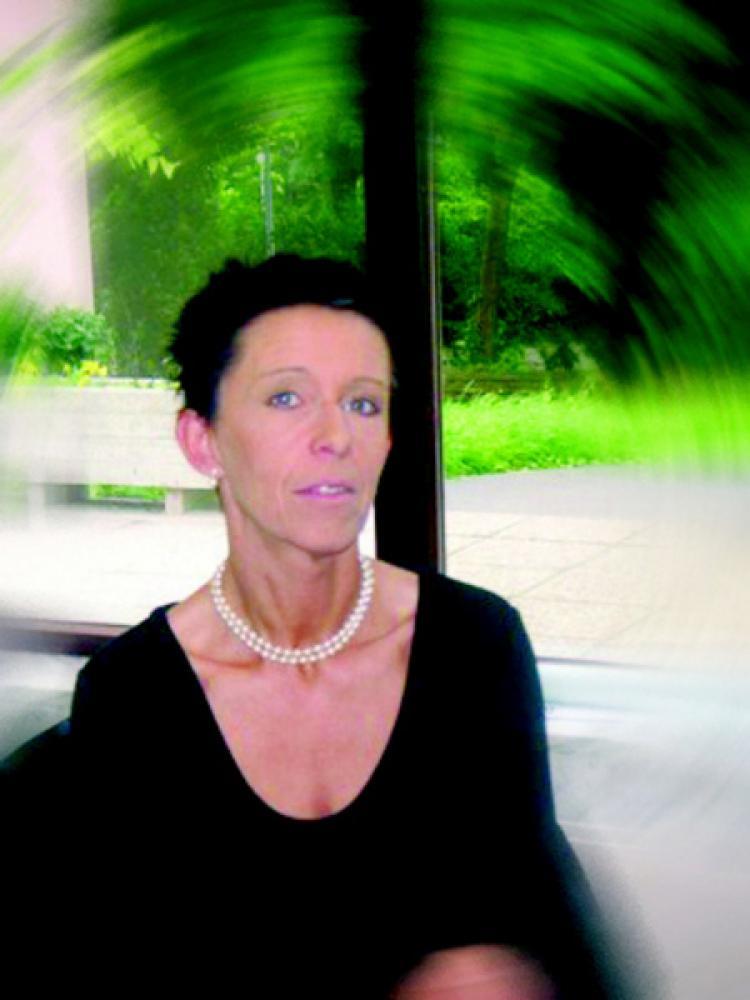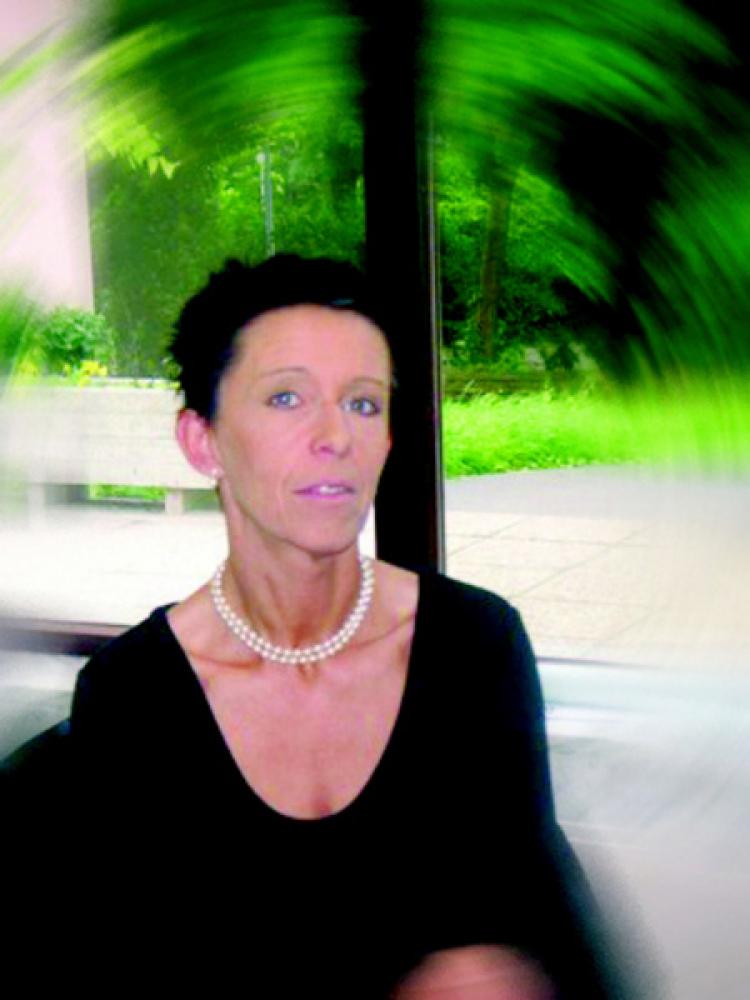“Imitations exist, but surely no secrets. That saying serves me well.” With this opening statement, Austrian Monika Mori, 48 years old, set the theme for the interview.
The former counselor for the long-term unemployed discussed distance and empathy and why people are so willing to tell their life stories, the good and the bad, aw well as their spiritual connection to the deceased Austrian pop idol Falco.
Mori started the conversation saying, “Prior to your arrival I had time to think and observe people. I like to approach people. When I observe people who are self-centered I would like to shake them awake, want to bring them to life - to animate them; re-animate them.”
The Epoch Times reporter responded, saying, “This statement presumes that some people are not actually living.” Mori went on, “I sense something along those lines and can tell from their faces and physical posture. Mind you, I am not an expert in body language - I simply sense these things. I attribute that to my work with people and as a trainer for a labor market service. These [abilities] are the background for my project. I target those who are out of work in general and in particular those who have been long-term unemployed. I live my life generally like that.”
Mori said she re-animates them, “By giving them undivided attention and by valuing them. Small things - it might sound trite, but to give them recognition and deem them to be all right as people.”
“I find it provides more opportunities to animate [others]. To wake them and have them awake, because that is the way I live. People sense this in me; I am unable to fake anything and I don’t wear a mask. When something moves me, whether good or bad, it could generate tears. A human being is the essence of all.”
The reporter mentioned that giving them recognition is a highly sensible trait, to which Mori replied, “Yes, I would consider myself a sensible person.”
Publishing a Book
Mori responded about her book “Hard Fact - Out of Work; Soft Skill – Creativity.”
“I became acquainted with Emil Kuzmanov, who has been unemployed for a long time. My e-mail to him inquired what he thought of a booklet [I wanted to write]. His replies are in my book. My goal had been to publish poems written and photos taken of people during their times of unemployment; how they manage their hurdles, by [creative] writing, through painting or the arts, perhaps singing - whatever. This resulted in people I did not know submitting their contributions. As a trainer for the unemployed this gave me a sense of having made a contribution, what unemployment looks like from their vantage points.
Mori discussed that long-term unemployment is a heavy subject to deal with and in all likelihood an unpleasant one for those involved. She said, “Long-term unemployment can be traced to many small incidents. People often become resigned to their fate and adapt to another mode of living. Another problem is that many fear the way the system works. Add to this poor health and problems with addictions. Alcohol is a huge factor, affecting both men and women. And debt; nevertheless, a good, open conversation can move many things forward. We need to act where the pressing need is.”
Regarding how impressive the book looks, Mori related, “The stories in the book show what a huge amount of trust was placed in us. One of the e-mail stories deals with an emotional letting-go; I cried and cried. Then I pondered on how to put this into written form in the book, so others could read it. We printed it unaltered, out of intuition, and not from artistic considerations. We respect these revelations and want to give them their due value, to have them appear in the form of a noble book, and not simply as some stapled pages. We wanted to use first-class paper, color and a hard cover; that was important to us, to create something valuable.”
Accomplishing this endeavor was a challenge, Mori shared, “I advanced financing. Emil did the book design pro bono. Only the sponsors who were with us from the inception of the book are given print credit, and that does not refer to outright financial support. My employer was quite generous. I work a 20-hour week. My employers made their facilities available so I could work on the project. The interesting thing was that with each poem, Emil and I became better collaborators. It was quite a process.
Life’s Challenges
On how Mori manages to separate herself from all the suffering she sees, she said, ”It was not always as easy as it might appear now. I need to relate some of my personal history.. I was diagnosed with MS in 2004 (multiple sclerosis). I did a lot of research and found that it is an auto-immune disease. Then I told myself “this is not going to work for me” and began to paint. I never got good marks in school for drawing. Nevertheless, I bought canvas and paint and began to draw circles, always circles. That prompted many things. Then I delved into color theory. Even today I will not tell anyone I am ill, but that I was diagnosed with something. Dealing with my condition this way made many people simply smile as if to ask, “Does she still play with a full deck?” and “She won’t last long.”
“I learned to emotionally separate myself. But it still moves me when people tell me their life story. I have had too many encounters with people who trusted me and told me their innermost thoughts. I guess the trust emanates from me. Once in a café house a 70-year old man sat down next to me and told me his story and cried. I thanked him for his trust and thought, “my goodness, now he must feel better.” I was moved, but did not get drawn into his suffering. I have learned this over time.”
The Meaning of Life
As for the meaning of life, Mori reflected, “There is a huge difference between spirituality and the institutional belief systems. There was a time when I questioned everything, each encounter. But now I have regained my inborn trust, that everything has its correctness. That applies to one’s fate as well. I have duties and tasks.
“We have a saying in Austria, ‘I would like to graduate from high school in this life, not in the next.’ That is why I confront my tasks and duties and try to complete them. But I am also aware that I cannot solve every problem, and then I let it go, let it simmer for a while. My son asks, “Don’t you ever quit,” because he observes me championing day and night for others. I replied, “I cannot do any different. When I sense a need, I have to do it.”
In response to one of Falco’s lyrics, “Out of the dark into the light,” Mori looks inward, “My present awareness tells me both have to exist, just like there is day and night, yin and yang. Sometimes we are lulled into believing that good is bad, and bad is good, without it actually being so. But it is not our place to condemn. But one must preserve one’s ethics. Two of my favorite terms are emotional intelligence and social competence. But I am searching for other terms - those two are wearing thin. For me everything amounts to being human, be human, be human.”
Regarding the limits of emotional intelligence, Mori said, “I like the Daoist approach - that each body represents a universe. A while ago I mentioned “gender mainstreaming.” I can partially deal with this concept fairly well, but lack comprehension for certain things. I am convinced - and being 48 I dare say this - men need to be permitted to be men, and women to be women. Male traits are valuable, as are the female traits. A mixture of the two - call it emancipation of equality - is a creation of thoughts.”
The reporter poses, “Meaning those don’t follow the realities of the human body.” To which Mori responds, “Yes, that’s the way I see it.”
Mori commented regarding the recent scandal surrounding anchorwoman Eva Hermann.* “Eva Herman is attractive and very feminine. But it showed people’s superficial reactions and their lack of understanding in dealing with what actually transpired and what was told.
“That also happened to me with my unemployment project. People often told me, ‘All they want is money.’ Then I stood at an outdoor market during Advent and froze my posterior off, to tell people what is really happening with the unemployed. That your neighbor might be out of work and might only go through the motions as if heading to work, because he is ashamed.
“It is important to me for people to realize this and not make superficial judgments. I defy such generalizations, because only if we work together can we help. Those battles with people’s attitudes - we can only succeed together. Either I deal with it or I ignore it, but fighting each other is energy lost. When we change our thoughts we can succeed. Why be enemies? This happens with families riding the subway and all the way to the work place - this is how I see it.
*Eva Hermann was a German TV host and author who worked as anchorwoman on the Tagesschau (today show). She was accused of being a Nazi sympathizer during a 2007 debate and lost her job because of it. There are different opinions about the issue and she has her sympathizers and accusers.
Read the Original German Article: http://www.epochtimes.de/articles/2008/07/15/312387.html







